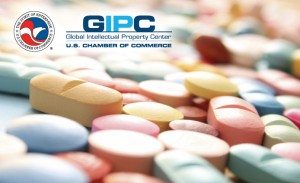 The U.S. Chamber of Commerce held its first Global Intellectual Property Summit on November 8, 2013, which focused on intellectual property issues facing businesses and consumers. One of the main topics of the event, touched upon by several of the speakers, was protecting the public from counterfeit medicines.
The U.S. Chamber of Commerce held its first Global Intellectual Property Summit on November 8, 2013, which focused on intellectual property issues facing businesses and consumers. One of the main topics of the event, touched upon by several of the speakers, was protecting the public from counterfeit medicines.
Jim Owens, a speaker from the American Pharmacists Association, cautioned consumers at the Summit, saying that when purchasing medicines from an online pharmacy “there’s really no way to assure that what you’re taking is really the product you’re intending to take.” Instead of what their doctors have prescribed, he said, consumers could be taking “a very good counterfeited product from an appearance perspective, but a very dangerous product.” (Watch a recent video where Mr. Owens speaks about his panel’s topic involving online pharmacies and safety.)
During his opening remarks, U.S. Chamber of Commerce President and CEO Tom Donahue also placed special emphasis on the issue of counterfeit medicines. According to Donohue, “Protecting patients from fake medicines requires a safe and reliable global supply chain. When this process works, health is improved and lives are saved.”
Donahue discussed what is being done to strengthen IP protections and secure legitimate supply chains: He expressed his enthusiasm about the recently passed Drug Quality and Security Act (H.R. 3204), which establishes a new “track and trace” system that will help to quickly identify and remove counterfeit medicines from the legitimate drug supply chain. He also mentioned that pharmaceutical companies are making significant investments to secure packing and distribution operations to provide patients the peace of mind that their medicines are safe and effective.
Lev Kubiak, Director of the National Intellectual Property Rights Coordination Center, also addressed the subject of counterfeit medicines from a law enforcement perspective. According to Kubiak, “Some Americans are being sold counterfeit pharmaceuticals, thinking that it’s the real drug, but there’s actually no active ingredient inside there, so absolutely no way for people to get better. Even in such cases like cancer medication.” During his panel, he pointed out that “[W]e are never going to be able to arrest or seize our way out of this problem. This doesn’t mean we need to stop prosecuting the perpetrators who distribute and produce fake medicines, but it does mean we need to do more.”
The passage of H.R. 3204 marks a great first step, but there is still the need to pair this law with strong industry leadership and increased public education on the dangers of counterfeit medicines. CSIP and its member companies are proud partners in the fight against illicit online pharmacies by educating consumers on how to identify fake medicines and partnering with other entities and law enforcement to take action.
####
The Center for Safe Internet Pharmacies (CSIP) and our 13 member companies have the shared goal of helping address the growing problem of consumer access to illegitimate pharmaceutical products on the Internet. Continue to read this blog for updates on CSIP’s education, enforcement and information-sharing efforts.

